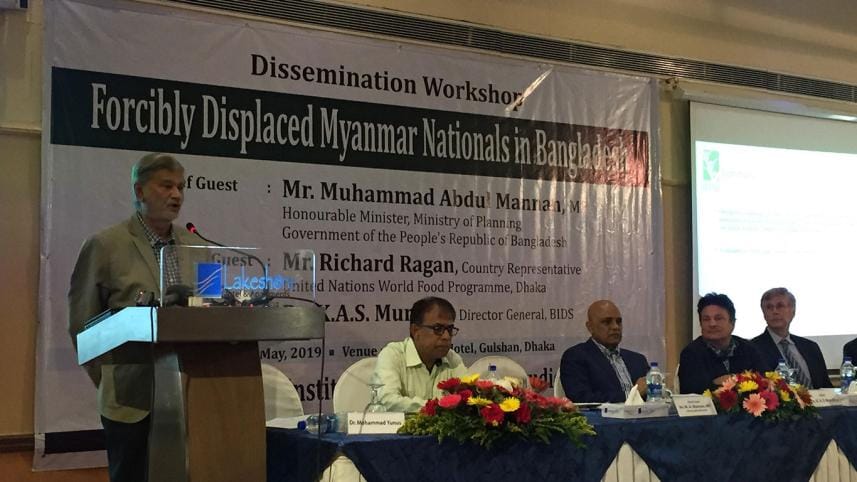‘Rohingya presence posing serious threat to host community’

Leading economists and policy analysts have rejected the idea of providing Rohingya people with access to the local labour market in Cox's Bazar and suggested quick repatriation of the Myanmar nationals to ease pressure on Bangladesh.
They said the international community should take responsibility as long as they stay here because their presence has already posed serious threats to the local environment and host communities.
The comments came after a presentation indicating that the impact on local peoples' wages won't lower if Rohingya are integrated into the local labour market provided there are investments in Cox's Bazar and Chittagong.
"If the labour market of Chittagong is considered, it can absorb the Rohingya without major fall in wage rates. If we can promote investments, everybody can gain," said Dr Paul Dorosh of the International Food Policy Research Institute (IFPRI).
However, Prof Wahiduddin Mahmud, a former adviser to the caretaker government, said it's not the issue of economic gains in case of Rohingya integration in the local labour market.
"It's rather the issue of capacity. We don't have it," he said on the sideline of a seminar titled "Forcibly Displaced Myanmar Nationals" jointly organised by the Bangladesh Institute of Development Studies (BIDS) and International Food Policy Research Institute (IFPRI) at Lakeshore Hotel in the city yesterday.
Bangladesh is a densely populated country with limited land and natural resources like the forest and hills. Also, due to rapid urbanisation and industrialisation, the arable land is shrinking very fast, he said
According to recent researches, the critical biodiversity areas in Cox's Bazar face a grave risk of peril. Already, more than 2,000 hectares of forest have been lost due to the influx of some 750,000 Rohingyas since August 2017.
"Therefore, it is difficult for Bangladesh to accommodate the Rohingya," Mahmud, a leading economist of the country told reporters on the sideline of the event.
Besides, Rohingya and Bangladeshis also have a lot of differences in social terms. For example, almost all Bangladeshi women go to the schools and their birth rate is low, which is just the opposite for the Rohingya women, he said.
"The only solution is Rohingya repatriation. And, the international community has to come forward to help them as long as they live here," Wahiduddin Mahmud said at the event.
Dr M Asaduzzaman, the consultant at the BIDS, said the Rohingya having access to labour market to Chittagong means they have access to whole Bangladesh. Its impact might be zero in terms of wage drop, "but, what is its foreign policy implications for us?" he asked.
According to researches by the BIDS and IFPRI last year, Rohingya have almost universally access to food assistance in the camps. Their caloric availability exceeds minimum required levels. However, their food diversity level is very low with little consumption of fruits, vegetables or animal sources' food.
It says children's nutritional status has improved compared to that of 2017, but malnutrition still remains unacceptably high. Among children aged 6-59 months who fled after August 2017, 32 percent are chronically undernourished and 13 percent are acutely undernourished.
Addressing the inaugural session, Planning Minister Abdul Mannan said Bangladesh faces a huge pressure in sheltering and taking care of the Rohingya – a difficulty imposed on the country.
"Yet, we are taking care of the people and want to solve the crisis peacefully," he said.
BIDS Director General KAS Murshid, World Food Programme Country Representative Richard Ragan among others spoke at the program.



 For all latest news, follow The Daily Star's Google News channel.
For all latest news, follow The Daily Star's Google News channel.
Comments